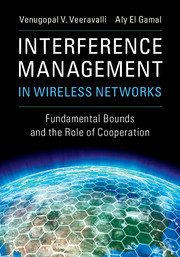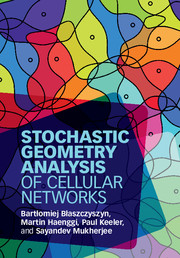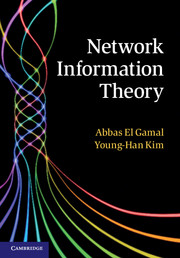Interference Management in Wireless Networks
Learn about an information-theoretic approach to managing interference in future generation wireless networks. Focusing on cooperative schemes motivated by Coordinated Multi-Point (CoMP) technology, the book develops a robust theoretical framework for interference management that uses recent advancements in backhaul design, and practical pre-coding schemes based on local cooperation, to deliver the increased speed and reliability promised by interference alignment. Gain insight into how simple, zero-forcing pre-coding schemes are optimal in locally connected interference networks, and discover how significant rate gains can be obtained by making cell association decisions and allocating backhaul resources based on centralized (cloud) processing and knowledge of network topology. Providing a link between information-theoretic analyses and interference management schemes that are easy to implement, this is an invaluable resource for researchers, graduate students and practicing engineers in wireless communications.
- Provides an information-theoretic framework for cooperative interference management in large networks
- Focuses on the use of centralized Coordinated Multi-Point (CoMP) technology for increasing network efficiency
- Emphasizes the use of practical interference management schemes
Reviews & endorsements
'This is a concise, rigorous and authoritative introduction to the information-theoretic analysis of interference management in wireless systems. It provides a principled and comprehensive reference for students and researchers with a background in communication and information theory.' Osvaldo Simeone, Kings College London
'Veeravalli and El Gamal have successfully captured in this book a most productive decade of fundamental research breakthroughs in our understanding of interference management and, especially, the role of cooperation in wireless networks. The topics covered are not only some of the most exciting directions for future wireless networks, but also they showcase some of the most elegant insights that information theory has to offer.' Syed Jafar, University of California, Irvine
'With new wireless networks becoming dramatically more complex to optimize, especially from an interference point of view, the availability of solid theoretical tools allowing to study the fundamental radio access performance of future mobile systems is a great plus to engineers and researchers alike. Up to my knowledge, this book is among the very first to give a solid and comprehensive analytical perspective in this area.' David Gesbert, EURECOM
'The book stands out with its comprehensive treatment of fundamental information-theoretic tools for interference management and with detailed descriptions of algorithms that implement these tools. The book is thus very valuable for everyone who wants to understand how to design good practical interference management systems.' Michèle Wigger, Télécom ParisTech
Product details
February 2018Hardback
9781107165007
226 pages
254 × 179 × 15 mm
0.61kg
37 b/w illus. 2 tables
Available
Table of Contents
- 1. Introduction to interference management
- 2. System model and sum capacity characterization
- 3. Degrees of freedom (DoF) and interference alignment
- 4. Iterative algorithms for interference management
- 5. DoF with coordinated multi-point (CoMP) transmission
- 6. Locally connected channels with CoMP
- 7. Backhaul load constraint
- 8. Cellular uplink
- 9. Dynamic interference management
- 10. Recent advances and open problems
- Appendix A. Information theory
- Appendix B. Algebraic geometry.







